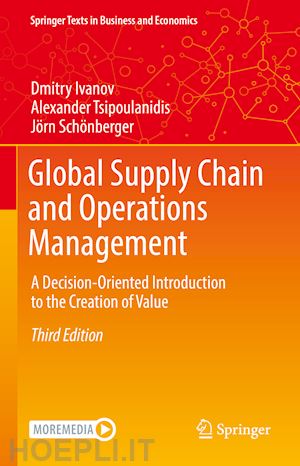
Questo prodotto usufruisce delle SPEDIZIONI GRATIS
selezionando l'opzione Corriere Veloce in fase di ordine.
Pagabile anche con Carta della cultura giovani e del merito, 18App Bonus Cultura e Carta del Docente
The third edition of this textbook comprehensively discusses global supply chain and operations management (SCOM), combining value creation networks and interacting processes. It focuses on operational roles within networks and presents the quantitative and organizational methods needed to plan and control the material, information, and financial flows in supply chains. Each chapter begins with an introductory case study, while numerous examples from various industries and services help to illustrate the key concepts. The book explains how to design operations and supply networks and how to incorporate suppliers and customers. It examines how to balance supply and demand, a core aspect of tactical planning, before turning to the allocation of resources to meet customer needs. In addition, the book presents state-of-the-art research reflecting the lessons learned from the COVID-19 pandemic, and emerging, fast-paced developments in the digitalization of supply chain and operations management.
Providing readers with a working knowledge of global supply chain and operations management, with a focus on bridging the gap between theory and practice, this textbook can be used in core, specialized, and advanced classes alike. It is intended for a broad range of students and professionals in supply chain and operations management.
Part I: Introduction to Supply Chain and Operations Management.- 1. Basics of Supply Chain and Operations Management.- 2. Examples from Different Industries, Services, and Continents.- 3. Processes, Systems, and Models.- Part II: Designing Operations and Supply Network: Strategic Perspective.- 4. Operations and Supply Chain Strategy.- 5. Sourcing Strategy .- 6. Production Strategy.- 7. Facility Location Planning and Network Design.- 8. Distribution and Transportation Network Design .- 9. Factory Planning and Process Design.- 10. Layout Planning.- Part III: Matching Demand and Supply: Tactical and Operative Planning.- 11. Demand Forecasting.- 12. Production and Material Requirements Planning.- 13. Inventory Management.- 14. Routing and Scheduling.- Part IV: Advanced Topics in Supply Chain and Operations Management.- 15. Supply Chain Risk Management and Resilience.- 16. Digital Supply Chain, Smart Operations and Industry 4.0.- 17. Pricing and Revenue-Oriented Capacity Allocation.- 18.Yield Management.
Dr. Dmitry Ivanov is a Professor of Supply Chain and Operations Management at the Berlin School of Economics and Law (HWR Berlin), Germany. For the past 20 years, he has been teaching operations management, supply chain management, and logistics at the undergraduate, graduate, PhD and executive MBA levels at various universities worldwide. He has authored over 300 publications, including more than 100 papers in international academic journals and several books published with Springer. Dr. Ivanov’s main research interests and findings range from ripple effect control in supply chains, development of structural dynamics control methods for supply chains, and the formulation and solution of scheduling problems in Industry 4.0, to digital supply chain twins. He is also an active editor for several leading international journals.
Dr. Alexander Tsipoulanidis, MBA, is a Professor of Supply Chain and Operations Management at the Berlin School of Economics and Law (HWR Berlin), Germany. He has over 20 years of international experience in factory planning and restructuring, optimizing existing operations, and supply chain and operations consulting. Dr. Tsipoulanidis has led teams to conduct “Lean Operations Assessments” within a production network spanning more than 40 international sites, has implemented SCM collaboration portals, and has run global SCM efficiency and restructuring programs. His research chiefly focuses on supply chain excellence and lean operations during the digital transformation.
Dr. JörnSchönberger is a Professor of Business Management at the Technical University of Dresden, Germany, where he holds the Chair of Transport Services and Logistics as part of the Friedrich List Faculty of Transportation and Traffic Science. Prior to his current position, he was a Professor of Supply Chain and Operations Management at the Berlin School of Economics and Law (BSEL), Germany, and a senior researcher at the University of Bremen, Germany. He has been involved in several academic programs at different study levels in Germany and abroad, offering various courses at the interface of engineering and business management. His research interests include the model-based optimization and control of complex logistics systems, and the synchronization of information and material flows.











Il sito utilizza cookie ed altri strumenti di tracciamento che raccolgono informazioni dal dispositivo dell’utente. Oltre ai cookie tecnici ed analitici aggregati, strettamente necessari per il funzionamento di questo sito web, previo consenso dell’utente possono essere installati cookie di profilazione e marketing e cookie dei social media. Cliccando su “Accetto tutti i cookie” saranno attivate tutte le categorie di cookie. Per accettare solo deterninate categorie di cookie, cliccare invece su “Impostazioni cookie”. Chiudendo il banner o continuando a navigare saranno installati solo cookie tecnici. Per maggiori dettagli, consultare la Cookie Policy.